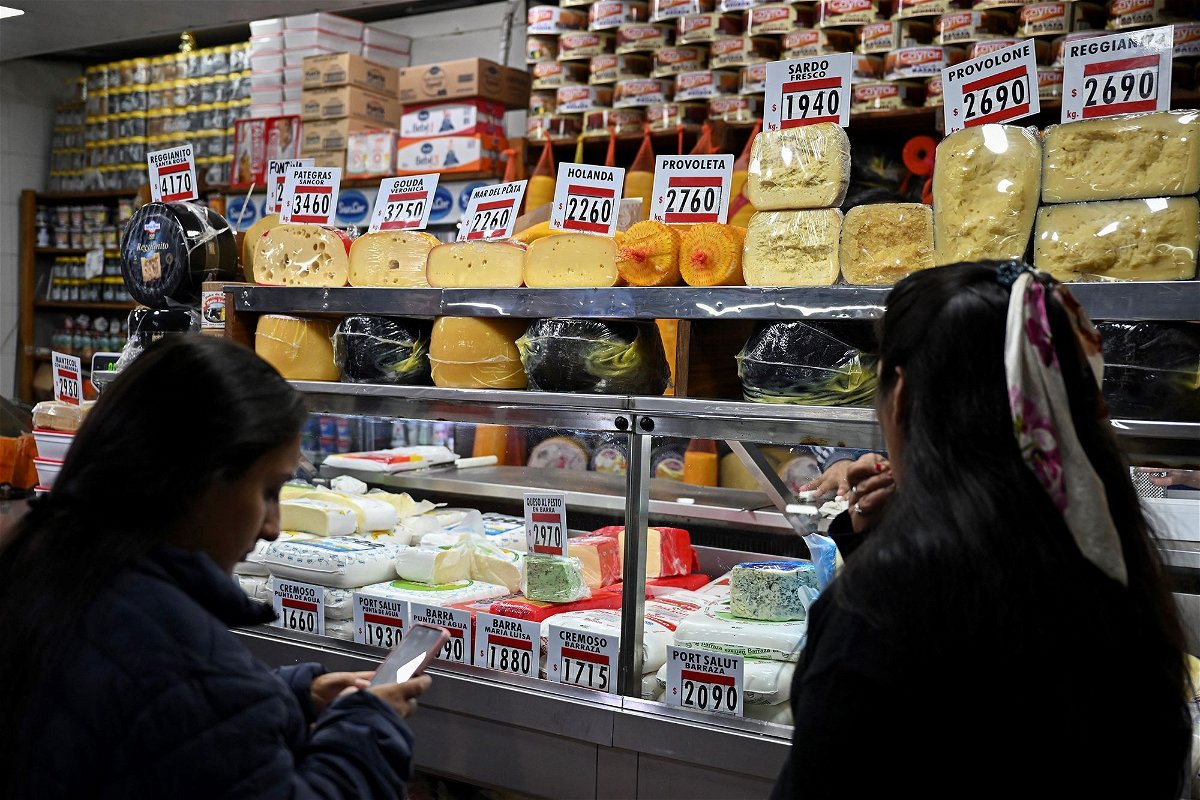If you think inflation in the US is high, look at the numbers in these countries

Women buy cheese in a stall at the Central Market in Buenos Aires
By Antonio Jarne and Krystina Shveda, CNN
(CNN) — Inflation in the United States may have subsided in recent months – it peaked above 9% last summer and declined to 4% this May, according to the Bureau of Labor Statistics’ widely used Consumer Price Index. But even at its worst, price increases were a drop in the bucket compared to what people in some less developed economies have been living with for years.
Several countries, including Venezuela, Argentina and Sudan have been saddled with skyrocketing costs for decades. Last year, consumer prices in Venezuela were more than four times as high as a year earlier, while in Argentina they were nearly twice as high as in 2021, according to data from the International Monetary Fund (IMF).
By comparison, the highest inflation that several generations of Americans – both millennials and Gen Z – have ever experienced was that of the past years, the IMF data shows. Since 1982, the start of the millennial generation, annual inflation in the US averaged 2.9% and only topped 4% six times, including the 2007-2008 financial crisis and after the Covid-19 pandemic.
In advanced economies overall, inflation averaged 2.4% since the 1990s – the earliest aggregate data the IMF has available. But the period of ultra-low inflation ended in 2021, due to factors including the pandemic and the Russian invasion of Ukraine, according to research by the Federal Reserve. In 2021, inflation in advanced economies – among them the European Union countries, United Kingdom and US – rose to 5.3%, and then to 7.3% in 2022.
And while Venezuela’s inflation has been continuous since at least the 1980s, according to the IMF data, it has been unprecedented in recent years. The Latin American country saw hyperinflation of more than 130,000% in 2018, when the government had to create a new currency, the Bolivar Soberano, worth 100,000 old bolivars, to simplify transactions. The price of a Coca-Cola can went from 2,800,000 “old” bolivars to 28 “new” bolivars.
In 2022, Venezuelan inflation was still 310%, the highest in the world that year.
Pensioners and public sector workers in the country have been affected the most, said Andrés Guevara, professor of economics at Andrés Bello Catholic University in Caracas and CEO of Omnis, a consultancy. The state pays pensions and civil servants’ salaries in the local currency, so as the bolivar devalues “it loses purchasing power and massively impoverishes these sectors of the population,” he told CNN.
“I can only buy a piece of cheese [with the pension],” Venezuelan pensioner Nelson Sánchez told CNN. He receives help from his children. “It took me a lot of time to adjust,” said Sanchez, who after 50 years of working began receiving money from his family.
Meanwhile, as prices rise in Argentina, wages have increased at a more frequent rate. “There are unions in some economic sectors asking for revisions every two months,” said Emiliano Anselmi, chief economist at Portfolio Personal Inversiones, an investment company based in Buenos Aires.
Another effect of inflation is people are spending their money as soon as possible. “Because everything will be more expensive tomorrow, people spend their money as they receive it, increasing the inflation,” Anselmi told CNN.
In the affected economies, credit is restricted, especially for the less affluent. “The credit market does not exist [in Argentina]. If you want to buy a house, you put it together dollar by dollar and pay it all at once,” Anselmi said.
As governments grapple with their finances, people have found ways to navigate these circumstances. One of the most common solutions is using a more stable currency, particularly the US dollar.
Using US currency for transactions is common in Venezuela, as people don’t trust the volatile local currency, according to Guevara. “There has been a factual dollarization of the Venezuelan economy,” he said.
Improving inflation in Venezuela requires better institutions with more transparency, Guevara said.
“There is no confidence, there is no rule of law and the institutional basis is quite weak. That is the underlying problem,” he said.
In Argentina’s case, Anselmi believes that after the 2024 elections, a new government will need to apply a stabilization plan to reduce the deficit and inflation. The plan could mean an increase in poverty and social conflict, especially in the first six months.
“In 2024, only blood, sweat, and tears await Argentina,” he told CNN.
The-CNN-Wire
™ & © 2023 Cable News Network, Inc., a Warner Bros. Discovery Company. All rights reserved.



